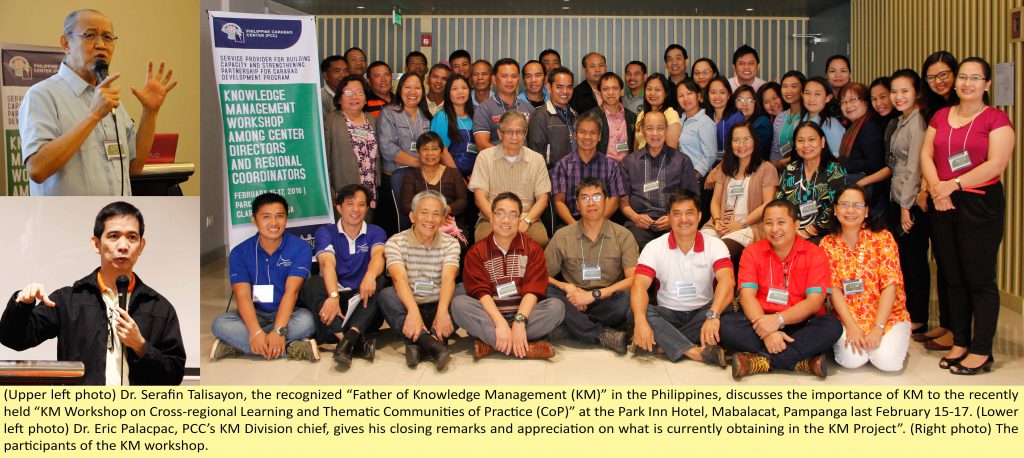“Over the past several years, the Philippine Carabao Center (PCC) only uses external knowledge management (KM) to promote its programs and services. Internal KM, on the other hand, is practiced across the network but not documented by the agency. This is why knowledge has to be explicit to fully utilize its benefits”.
This was a statement verbalized by Dr. Eric P. Palacpac, chief of PCC’s Knowledge Management Division (KMD) in his closing message during the recently held “Knowledge Management Workshop on Cross-regional Learning and Thematic Communities of Practice (CoP)” last February 15 to 17 at the Park Inn Hotel in Mabalacat, Pampanga.
Said workshop was facilitated by the Southeast Asian Regional Center for Graduate Study and Research in Agriculture (SEARCA) as the service provider of the agency for capability building and strengthening partnerships in Carabao Development Program (CDP).
The Carabao-based Enterprise Development (CBED) under the CDP, one of the banner programs of the PCC, is focused on the establishment of village enterprises that promote cooperative development, participative decision-making, and harnessing the potentials of farmers for income generation.
KM4CBE or Knowledge Management for Carabao-based Enterprises is a deliberate effort of the PCC to institute a systematic documentation and use of knowledge across the PCC network.
Dr. Serafin Talisayon, the recognized “father of KM” in the Philippines, facilitated the workshop.
“KM, as defined by most of KM gurus, globally, is a knowledge that enables effective action. Knowledge is only knowledge if it is actionable by individuals or groups. KM is a very important factor if what the agency desires is to achieve its objectives the most effective and efficient way,” Dr. Talisayon said.
“Knowledge has also two forms: tacit and explicit,” he further explained, “For an institution to be more effective in implementing its target objectives, it has to perform the right combination of tacit and explicit knowledge”.
Dr. Talisayon differentiated tacit and explicit knowledge: “Tacit knowledge is unrecognized, unexpressed or undocumented knowledge while explicit knowledge is documented, encoded or recorded knowledge. Expertise, indigenous knowledge, undocumented work processes; manuals, hardware and software, are examples of tacit and explicit knowledge, respectively”.
Dr. Alexander G. Flor, Dr. Maria Celeste H. Cadiz, and Ms. Rosario Bantayan, also from SEARCA served as resource persons and workshop moderators.
Gloria Dela Cruz, center director of PCC at Don Mariano Marcos Memorial State University, said the KM workshop is really helpful. She committed to immediately apply KM in their current programs and services so that effective and efficient program implementation is met.
A series of other workshops on KM4CBE are scheduled this year. The next KM workshop would be on “KM Writing on Effective Knowledge Products” to be conducted in April in Batanes.
The activity was participated in by 41 PCC staff members across its regional network and headquarters.

